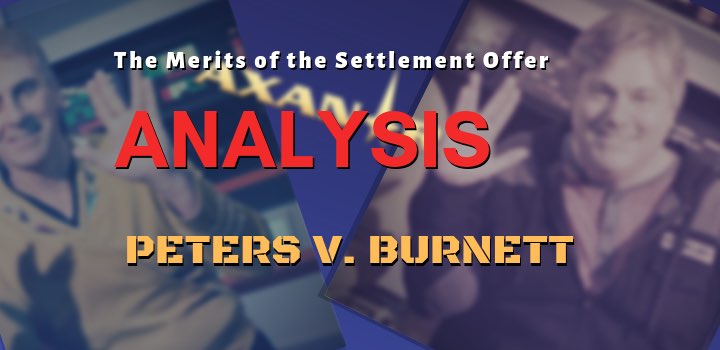 Original image from Axanar Productions
Original image from Axanar Productions
FEBRUARY 26, 2019 | 4 MIN READ
The Legal Merits of Peters' Settlement Offer
Was Axanar’s former director right to refuse to settle Alec Peters’ lawsuit against him?
Former Axanar director Robert Meyer Burnett refused producer Alec Peters’ settlement offer. Was that a good idea? We asked an attorney in Georgia, the state where Peters wants the suit tried. What he told us:
Main story: Peters Sues Former Axanar Director in Georgia Court
See also: Peters Proposed Settling with Burnett
 SIGN UP You can subscribe to AxaMonitor Daily to be the first to read news stories like this from AxaMonitor.
SIGN UP You can subscribe to AxaMonitor Daily to be the first to read news stories like this from AxaMonitor.
'One-Sided Settlement'
- The settlement’s incredibly one-sided. Burnett gives up everything, while Peters only promises to not badmouth Burnett.
- It doesn’t actually settle any claims against Burnett. Sure, it looks like he’d avoid any lawsuit by doing everything Peters wants but the agreement should expressly release all outstanding claims. Peters doesn’t do that.
- Peters could still sue even if Burnett abides by everything in the agreement. To put a fine point on it, our consulting attorney says:
« It’s bullshit from a settlement perspective, obviously meant to make a non-lawyer think it is a settlement, but it really is not. »
A Setup?
- Setting Burnett up for another suit: Peters asks Burnett to acknowledge the existence of what Peters says are loans — $31,550 worth. Under these terms, Peters could go on to sue Burnett later for non-payment and Burnett couldn’t deny the payments were a loan.
Losing Copyright
Giving up copyright: Peters wants Burnett to give up any claim of ownership or copyright to any Axanar material, such as Burnett’s recently released documentary work.
- That’s probably worthless. Burnett’s ownership of work apart from Star Trek intellectual property wouldn’t be released even by this kind of agreement with Peters.
- The Copyright Act requires a valid written reassignment of copyright. This agreement fails to qualify as such.
- Cribbing from CBS’ fan film guidelines: Peters appears to have modeled this provision from similar language in the guidelines. But CBS owns the underlying IP in the case of fan films. Peters isn’t likely to own the IP in Burnett’s work.
- Were CBS to sue a fan film it wouldn’t be because it violated the guidelines. It would be simple copyright infringement. The guidelines are legally irrelevant. “Alec doesn’t understand the difference,” the attorney tells us.
- Freedom of speech: Peters wants to keep Burnett from producing any kind of documentary about Axanar. Freedom of speech would likely protect Burnett, even if he signed the agreement.
Which State’s Law Governs?
The offer doesn’t say, though the case is being tried in Georgia, but Burnett is a California resident.
Why it Matters
Nondisclosure agreements (NDAs) are a form of restrictive covenant treated differently by each state.
- California is very pro-freedom of employment, so some provisions may be unenforceable there.
No time limitation: In most states, for any restriction to be enforceable it must be reasonable in duration and scope.
Stale Information
- If what Burnett keeps confidential for Axanar isn’t a true trade secret Peters may be out of luck. The theory here is that eventually information that isn’t truly a trade secret (like, say, the formula for Coke) — and what about Axanar is like that given that it’s based on intellectual property it doesn’t own? — it eventually goes “stale.”
- This agreement literally goes on forever: Most states’ law doesn’t look favorably on holding someone liable to protect information that isn’t valuable anymore.
Overly Broad
Peters is trying to keep Burnett from talking about more than most states’ laws will allow.
- Proprietary information that isn’t confidential. Take Axanar’s logo, for example. It’s someone’s property but isn’t confidential. This agreement keeps Burnett from even speaking about the logo.
- Courts don’t like that. How come?
- Restricting free speech is significant public policy, so courts generally examine such restrictions as if applied as broadly as this one.
Any ambiguity favors Burnett. Almost every state construes agreements against the interest of the party who drafted it — Alec Peters, in this case.
- So if there’s any uncertainty about scope or duration of the agreement, Peters and Axanar likely end up the losers.
The Bottom Line
No good reason appears to exist for Burnett to have agreed to Peters’ settlement offer. 
COMMENTS
Discuss this article in AxaMonitor's Facebook group.
Keywords
